Many people in many different countries around the world have been affected by genocide. When most people think about genocide they think about World War II and the Nazi’s decimation of Jewish people. Many people think that genocide is a thing of the distant past, but in Cambodia it is all too recent. From 1975 to 1979, only 38 years ago, Cambodia was thrown into chaos, by a radical regime, the Khmer Rouge and their leader, Pol Pot. Pol Pot saw hardships faced by people living in provinces outside the cities and blamed it on the people living inside the city. He saw education and wealth as a selfish and destructive nature that needed to be eliminated. Yesterday myself and others on the trip visited a cite where his radical ideas became a reality, and what a disgusting and horrific reality it was.
Upon arriving, the first thing you notice is an articulate archway, created in the traditional Cambodian fashion, as well as a tall building built with the same beautiful architecture, about 100 yards away from the entrance. After we walked inside the camp we dawned our headsets and began the audio tour. Another student on the trip, David, explained an interesting view of this after the tour stating that it felt odd to him that we had the privilege to listen at our own leisure and pace while we were walking on the souls of thousands. As we walked towards the first checkpoint, we grew nearer to the large ornate tower in the center. As we came closer the beauty of the architecture fades away as you notice the thousands of skulls and bones displayed inside; it was truly perturbing.
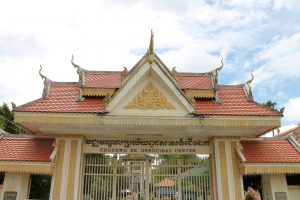
Entrance
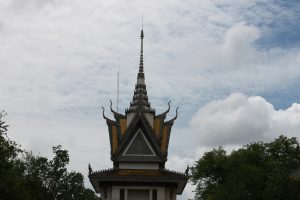
tower in center
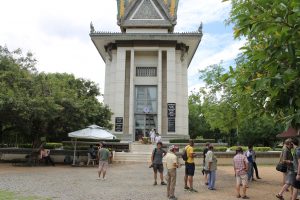
tower as we came closer
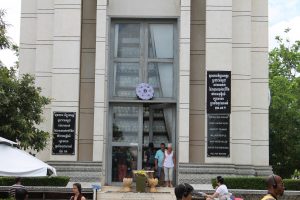
I won’t go into every detail of the audio tour, as it would take up too much time and my memory would not do it justice. As I began to walk around one of the things I noticed was birds singing and wildlife in full bloom. It was an oddly peaceful and almost tranquil place to be; almost as if it were a place to meditate and relax.
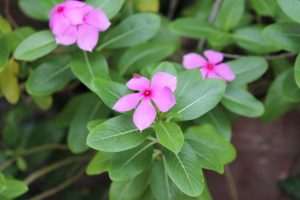
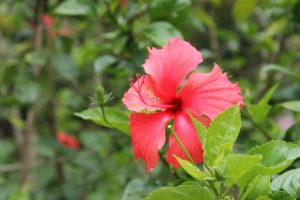
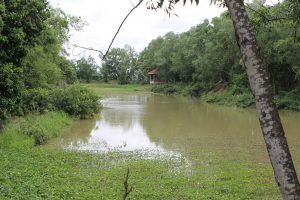
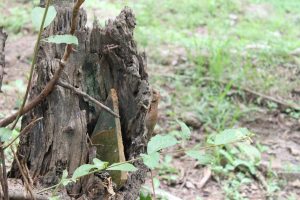
The path we walked and the audio tour portrayed a very different more terrifying realization. As you walk down the path there are sometimes fragments of bone and teeth scattered on the ground. There are dozens of pits and small mounds where mass graves had been excavated and the horrible reality hidden beneath brought into light for all to see. On the tour there were signs with descriptions of each area and recreated pictures of what the place was like while the killings were happening. Death and despair was everywhere and you could feel it.
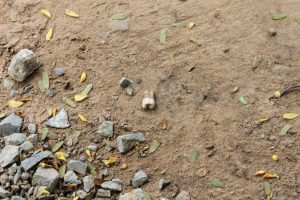
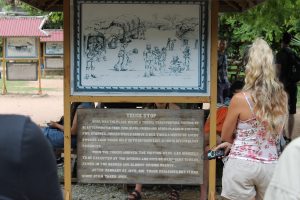
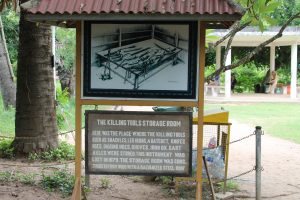
The mass graves have been decorated by tourists with bracelets as a sign of respect and sorrow for the victims, two places in particular had many bracelets; the mass grave of women and children and the child killing tree.
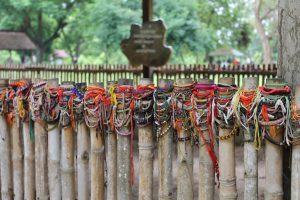
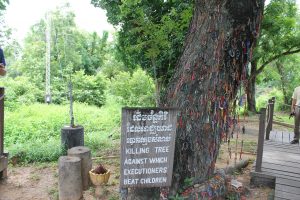
As the tour moves on. It brings you to a tree titled “The Magic Tree” that is explained to be the same species of tree under which Buddha found enlightenment. However this specific tree is ironically called this and was used to hang tools of massacre as well as lights and speakers that blasted revolutionary music to drown out the screams of agony. The audio tour provided a music clip of the music combined with a diesel generator recreating the noise the victims last heard. This was the hardest part of the tour for me and many others. The noise was terrifying and seemed to bring up the emotions of the anguished souls. There are no words to describe the feeling.
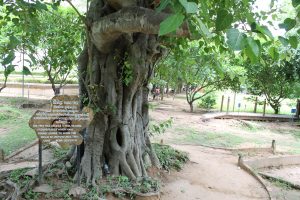
At the end of the tour we were allowed to visit inside the tower, I think it was called the Shtupa but don’t quote me on that. As we entered, we took off our shoes out of respect and were offered to buy incense or flowers to leave for the memorial. Inside the tower were many skulls and bones as well as the killing tools. Each skull had a different marking describing how they were killed.
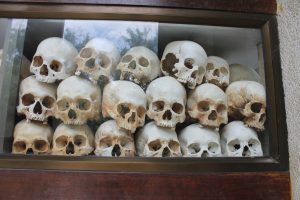
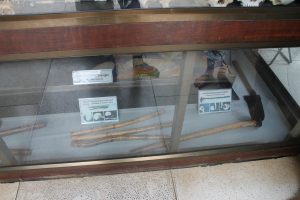
This place is rough on the conscience and for religious people can be a place of questioning. If there is a God how could he let this happen? How can the world be so cruel if there is an almighty? Many people would answer different things, but none of them can take away the heaviness of the reality. After leaving this place I felt I will never be the same. It is hard to go on living the privileged way we do when you know there was and still is so much hardship for others. This place and this country makes me feel ashamed of my fortune and ashamed of my trivial worries. There is nothing left to do but give back as much as I can and try to better myself and the people around me one action at a time. Let this place be a reminder to all of the terrible possibility of genocide. It could happen anywhere, but when the time comes we must make an effort to prevent catastrophes like this to ever happen anywhere.
